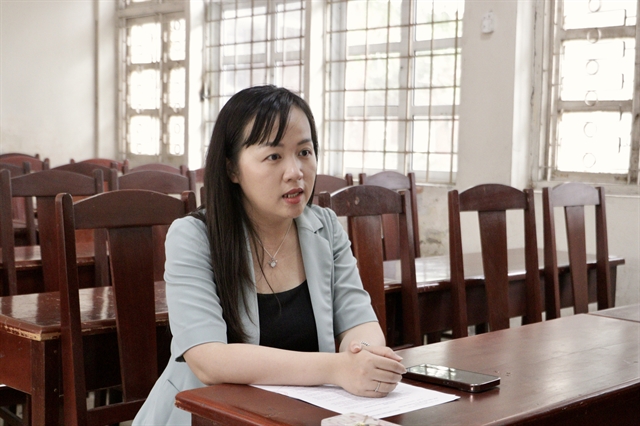 Society
Society


|
| An increasing number of students are aligning their academic choices with the demands of global integration and the international labour market. — VNS Photos Thuỳ Dung |
By Xuân Nhi, Thuỳ Dung, Khánh Huyền
HÀ NỘI — With just over a month until the 2025 high school graduation exams and university admissions officially begin, many Vietnamese 12th graders are no longer focused solely on competing for top scores or chasing trending majors. Instead, they are setting their sights on a broader goal – becoming global citizens.
According to recent surveys and observations during university admission consultations, many high school seniors in major cities like Hà Nội and HCM City are showing a more visible inclination toward globally integrated disciplines. Fields such as Data Science, International Communication, Logistics, Environmental Technology and International Relations are gaining traction for their strong potential in a globalised job market.
Nguyễn Trần Gia Khánh, a 12th-grade student at Trần Phú High School in Hà Nội said: “I want to study International Communications so I can work in a global environment in the future. If I can obtain a scholarship, I will try to study abroad. I love experiencing different cultures and aspire to work for an international organisation.”
At a recent university admissions seminar in HCM City, many students actively asked about international joint programmes and majors offering opportunities to work abroad or in multinational corporations. Among these young people, the mindset of “studying to get a job” is evolving into “studying to become a global citizen.”
Trần Thị Hải Anh, a parent of a high school senior in Hà Nội said: “International Relations and Diplomacy are very challenging fields to enter because they require advanced language skills, and selection criteria are very strict, as these roles represent the image of the entire nation.”
Nevertheless, she believes that if her child has the confidence and capabilities, the family will fully support their choice.
“Most importantly, the major must fit the student’s passion and aptitude. Rather than imposing their will, parents should accompany and encourage their children to make informed choices based on genuine interest.
“No matter how globalised the major seems to be, without passion and capability, their path can be unsustainable in the long run,” said Hải Anh.
However, many young people do not fully grasp the realities behind these majors, particularly the demands for language proficiency, self-learning and soft skills. Mistaking a major that sounds impressive on paper for a guaranteed pathway to international opportunities can result in rushed, misguided decisions.
Dr Nguyễn Thị Thu Hà, lecturer of International Relations at the Academy of Journalism and Communication said: “Many students are attracted to majors with ‘international’ in the name, thinking they will have many opportunities to go abroad. However, ‘international’ only describes the scope of activity, not the specific expertise.”
People often have the impression that International Relations means working in diplomacy or living overseas, while in reality, the field includes various branches such as international economics, international politics, and international communications — all requiring solid professional knowledge, language skills, analytical thinking and persistence, Hà explained.
“Not everyone in this field ends up following the path they imagine. Some graduates work in journalism, communications, research, or for NGOs. Therefore, students need to do thorough research before making decisions,” she stressed.
While acknowledging the vast opportunities offered by these majors, Hà advises students to develop themselves, not only academically but also in terms of soft skills, personal resilience, and flexibility.
Studying International Relations or any global major requires a genuine passion for international affairs, economics, law and history in addition to strong language skills.

|
| Dr Nguyễn Thị Thu Hà discusses students’ growing interest in globally-oriented majors. |
She also highlights the importance of practical experience through extracurricular activities, competitions, simulation conferences, or scholarship programmes.
“Don’t hesitate to sign up and explore. Volunteering, joining international organisations or working in journalism are great ways to gain real-world experience and develop skills,” Hà advised young people.
The inclination towards internationally-oriented majors reflects the Vietnamese young generation’s strong integration spirit and aspiration to become global citizens.
For students and their parents during the admissions season, choosing a major is only the first step of a long journey of understanding themselves, their chosen field, and making persistent efforts to build the foundation for their own future.
Their aspiration to become global citizens depends not on the name of their major, but on their actual capabilities, adaptability, and willingness to learn. — VNS




